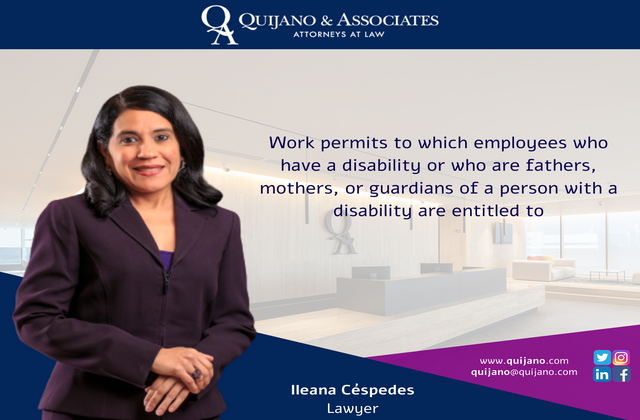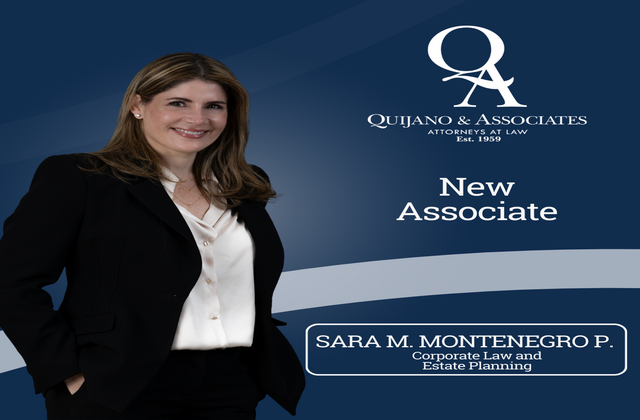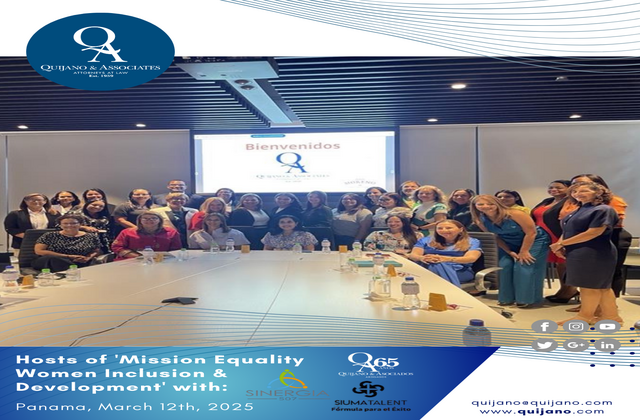Work permits to which employees who have a disability or who are fathers, mothers, or guardians of a person with a disability are entitled to

By means of Law No. 15 of 2016, which amends Law No. 42 of 1999 by means of which equal opportunities for persons with disabilities is established, it seeks to include individuals who suffer from some type of disability to society, providing them with the same opportunities not only in the social, but also in the educational and labor fields.
The World Health Organization (WHO), published in 2001 the International Classification of Functioning (ICF) of disability and health, establishing that there are the following types of disability:
1. Physical or Motor Disability: Physical disability is that which occurs when a part of the body is missing or has very little left, which prevents the person from functioning in the conventional manner.
2. Sensory Disability: Corresponds to the type of people who have lost their visual or hearing ability and who have problems when communicating or using language.
3. Intellectual disability: Intellectual disability is one that presents a series of limitations in the daily skills that a person learns and serves to respond to different situations in life.
4. Psychic disability: Psychic disability is that which is directly related to the individual’s behavior. It is said that a person has a psychic disability when he/she presents disorders in adaptive behavior. This type of disability could be included in the other category since it is related to mental illness.
According to article 17 of Law 15 of 2016 by which Law No. 42 of 1999 is amended, the employer has the obligation to grant workers with disabilities, fathers, mothers, or relatives within the fourth degree of consanguinity and second degree of affinity, guardian or person authorized by the legal representative of the disabled person empowered to accompany him/her to appointments, required treatments or educational activities related to the condition of disability, the permits that he/she needs.
In order for the employee to be able to make use of the benefit granted by law, he/she must:
1. Request the leaves in advance. Executive Decree No. 333 of 2019 by which Law No. 15 of 2016 reforming Law No. 42 of 1999 is regulated, establishes in its article 12 that the permits must be requested five (5) days in advance of the use thereof.
2. The request may be made later on an exceptional basis if the disabled worker or the person exercising his/her representation has a proven medical emergency, in which case he/she must deliver the record up to five (5) days after the fact or as provided by the Internal Labor Regulations of the company.
In this order of ideas, we have that the employee has the obligation to present the proof of attendance to the treatment or educational activities. The law does not establish when they must be presented, so it is recommended to regulate it in the Internal Labor Regulations or by means of an agreement subscribed with the worker, but in any case, it should not be more than five (5) days.
The worker, according to the law, has the right to one hundred and forty-four (144) hours per year to attend treatments or educational activities of their children or person with disabilities under their care. This time is independent of the right to vacations, sick leave, and other leaves to which he/she is entitled in accordance with the Labor Code and the Internal Labor Regulations.
According to the second paragraph of article 12 of Executive Decree No. 333 of 2019, one hundred and forty-four (144) additional hours to those already established by law may be granted upon analysis, evaluation, and subsequent approval by the employer. The worker who claims the extension of the one hundred and forty-four (144) hours per year must submit to the Human Resources Department of the company for which he/she works, the certification of the treating physician stating the extension of the treatment, which will be attached to the worker’s file. Once the requested extension has expired, the employer will proceed to deduct the worker’s own leaves and incapacities.
Finally, article 13 of Executive Decree No. 333 of 2019, states that when two or more family members of a person with disability work for the same employer, the one hundred forty-four (144) hours must be granted individually to each worker, however the hours granted are not duplicated if the worker has more than one person with disability, unless he/she is the only person in charge of the disabled person.




